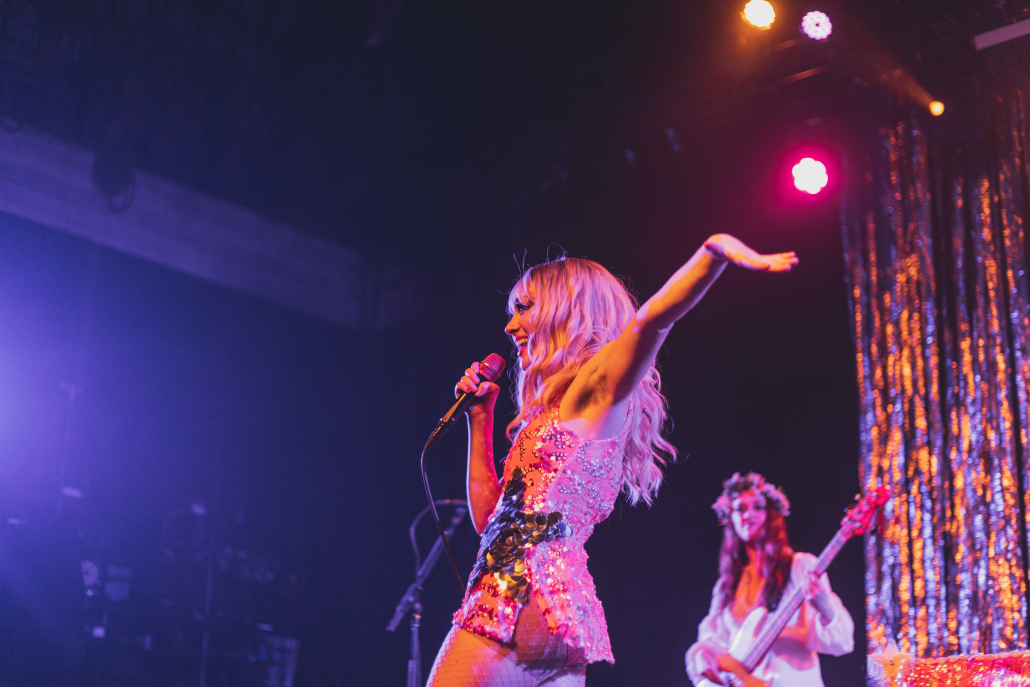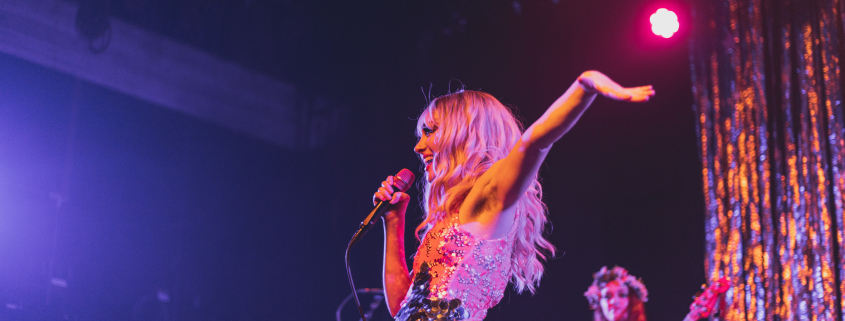Chappell Roan: The ‘Kaleidoscope’ interview

When Chappell Roan first emerged on the alt-pop scene as the small-town chanteuse from Willard, Missouri, she built a fanbase on her introspective songwriting and powerful vocals. In 2017, she released her debut EP, “School Nights,” which drew from rock and electronic influences. While she was inspired by artists like Lorde and Lana Del Rey, her voice and message set her apart from that of her contemporaries.
Since then, Chappell Roan’s unique perspective has been a throughline; her recent releases “Casual” and “California” maintain her vulnerability despite the dance-pop evolution of Chappell Roan’s work. A recent highlight comes in the form of “Pink Pony Club,” a bass-booming celebration of queer resilience. On the heels of her most recent tour, “Naked in North America,” Chappell Roan sat down with Daily Trojan to talk about her mental health journey, fostering safe spaces for queer communities and her newest single, “Kaleidoscope.”
Daily Trojan: Congratulations on finishing tour! How do you feel?
Chappell Roan: I feel really tired. But it’s a good tired. I loved it. It was just so fucking hard. The shows, the [drag] queens and the band, they made it all worth it.
DT: What would you say has been that moment from the tour that you’ll take with you?
CR: My hometown, probably. I’ve never played my hometown. And I’ve never asked the crowd to put up with flashlights on their phones or whatever, but they did. I looked up from singing one of my songs, ‘coffee,’ that’s unreleased. And I just cried.
Because it was 900 people, which is really big for how small my hometown is and it was really hard to sell [the Gillioz Theatre] out. And they did. It gave me a new appreciation and love for my hometown, which I really struggle with, because I did not have a good time growing up.
There’s a community here for me, and I never knew that existed before then. It was really special.
DT: You’ve spoken about not identifying with who you were in the “School Nights” era anymore. Do you think that your hometown was part of that era of Chappell?
CR: Yeah. I was just really like mentally ill growing up and I had a really tough time. I wrote all those songs when I was living there and about that time in my life. I’m not there anymore, thankfully, but it’s hard to sing those songs sometimes because it’s like ‘damn, I do not feel that way anymore.’
DT: Have you heard from anybody in your hometown?
My family and friends are so supportive, but I feel, after that show, really supported by a community there. I got a few people coming up and saying, ‘Thank you for creating a queer space here,’ because it’s not predominantly queer, like West Hollywood, you know? So that was really important.
DT: What is one word you’d use to describe who you were at that time?
CR: Lost.
DT: And what is one word you’d use to describe yourself now?
CR: Resilient.
DT: How did you get to the point where you can honor that part of yourself in the past but still recognize who you are now?
CR: Therapy. Ending relationships that were not healthy. It took years to move from that space to here. And you know, I was diagnosed with bipolar two disorder when I was 22. Medication really, really helped me. Taking care of myself really helped me.
Honestly, being single really helped me. I think we just really don’t take care of ourselves, sometimes, when we are dating someone.
DT: You’ve said that Los Angeles — West Hollywood specifically — allowed you to be who you want. Who do you want to be?
CR: I want to be safe. I think I just want to feel safe. Whether that means being queer and being a woman, I want to provide that for other people. I want to honor my younger self and give her life that she did not get.
Being bipolar, I was so depressed as a little kid and so angry. You just think you’re such a bad person, and don’t realize that you’re really sick and need help, and our parents don’t know how to deal with it. I think it’s like rewiring my brain to be like, ‘actually, you’re a good person, and you’re creating a safe space and music for people to dance to.
DT: There’s a lot of queer students here at USC that are coming from states in the Midwest where there has been a lot of homophobic legislation recently. As someone who was able to find yourself here, do you have any words of advice?
CR: You don’t have to subscribe to the whole system of categorizing yourself. You don’t have to be a ‘hey mamas’ lesbian or a hyper-femme girl. You don’t even have to come out. You can just be you and be like, ‘Yeah, I date girls.’
Queerness can be as much of a part of your life as you want. Some people are way more comfortable being out and loud, which is amazing. And some people want to just be really insular about it.
I think we have to honor both of those people. I think media often wants you to be loud, and sometimes it’s really hard for people who are struggling with queerness, too scared to come out or don’t know how to identify. I think you don’t have to subscribe to a box. You can just simply be gentle with yourself. Find people who are safe to experience, to explore queerness with.
DT: The album you’ve been hinting at has not come out yet. Which song was your favorite to write in this new era?
CR: My favorite song is coming out on March 31. It’s called Kaleidoscope, and it’s the only song I wrote by myself on the album. I love collaborating, but this one just came out of me one day. We haven’t had a really sad song for a sec. It’s just really deep. I’m most excited for that.
DT: Speaking of collaborators, do you have any collaborations you’re excited about or would like to shout out?
CR: The person I work with the most is Dan Nigro. He co-writes all my stuff and he produces it for the most part. We have a few other writers too. All of my collaborators are my friends. The same friends who I went to summer camp with made my videos for “My Kink is Karma” and “Casual.” One of my best friends shoots everything for me, like all the photos, the covers, the music videos. I hire my friends and everyone is very passionate. In L.A., it’s the best thing to do because it’s such a ladder system to climb, bringing your friends up with you.
I’d also like to shout out Misha Sattar. Misha is my creative director and designed all my merch. She’s just like, amazing. She’s my best friend.
DT: If it’s alright with you, Daily Trojan has some student-submitted questions.
CR: Cool.
Jenna Peterson: I’m a huge fan of you and your song “Pink Pony Club”. And I’m impressed by how you managed to create a work that’s simultaneously in celebration of the queer community in L.A., and an homage to your hometown. How does it feel to see the track resonate with so many people?
CR: I think no matter how far I tried to push away from my upbringing, it’ll always be a part of me. No matter if I moved to L.A. in New York, that part of me, that trailer-park vibe is always part of me. It just naturally comes out in my songs.
“Pink Pony Club” came out in April 2020, when the world was ending. It got some people through it. I got inspired by a gay club and I wrote about it because I really wanted to dance there. They had Go-go dancers, and I was like, ‘Oh my God, I want to dance so bad.’ Because it’s so sexy, and free. And I tried to capture that in a song.
I think a lot of people like feel that way of capturing a dream of leaving your hometown and going to a big city, and being around a community that makes you happy. Even if your parents don’t approve. I think a lot of people relate to that.
Elijah Ruano: As artists, it is so important to have a unique voice and a unique perspective that kind of gives you your own style but also appeals to audiences of different kinds. How have you found your own voice along the way and how has this affected the work that you’ve been producing? And where you want to go in the future?
CR: I found my own voice by following my inner child. Like, what did a pop star look like? What did I think a pop star would be? I got to grow up with Gaga and Katy Perry. Lorde was my girly like, I’m so lucky that that was my era. I look back to that and am like ‘what can I give myself that I could not give myself then.’
I found my voice through therapy, through inner child work, through exploring queerness and fashion and trying things with makeup. Just exploring yourself and being letting yourself be bad at something. And I think moving out her and exploring things outside of the entertainment industry is so important. That’s how I found myself.
DT: What’s next for Chappell Roan? Any hints of your upcoming album?
CR: It’s like Kate Bush but a little sluttier. Just a little more queer. My project is like Hannah Montana for adults.
Chappell Roan finished her first headlining tour, “Naked in North America,” at the Fonda Theatre in L.A. March 15. Her newest single, “Kaleidoscope,” comes out March 31.

